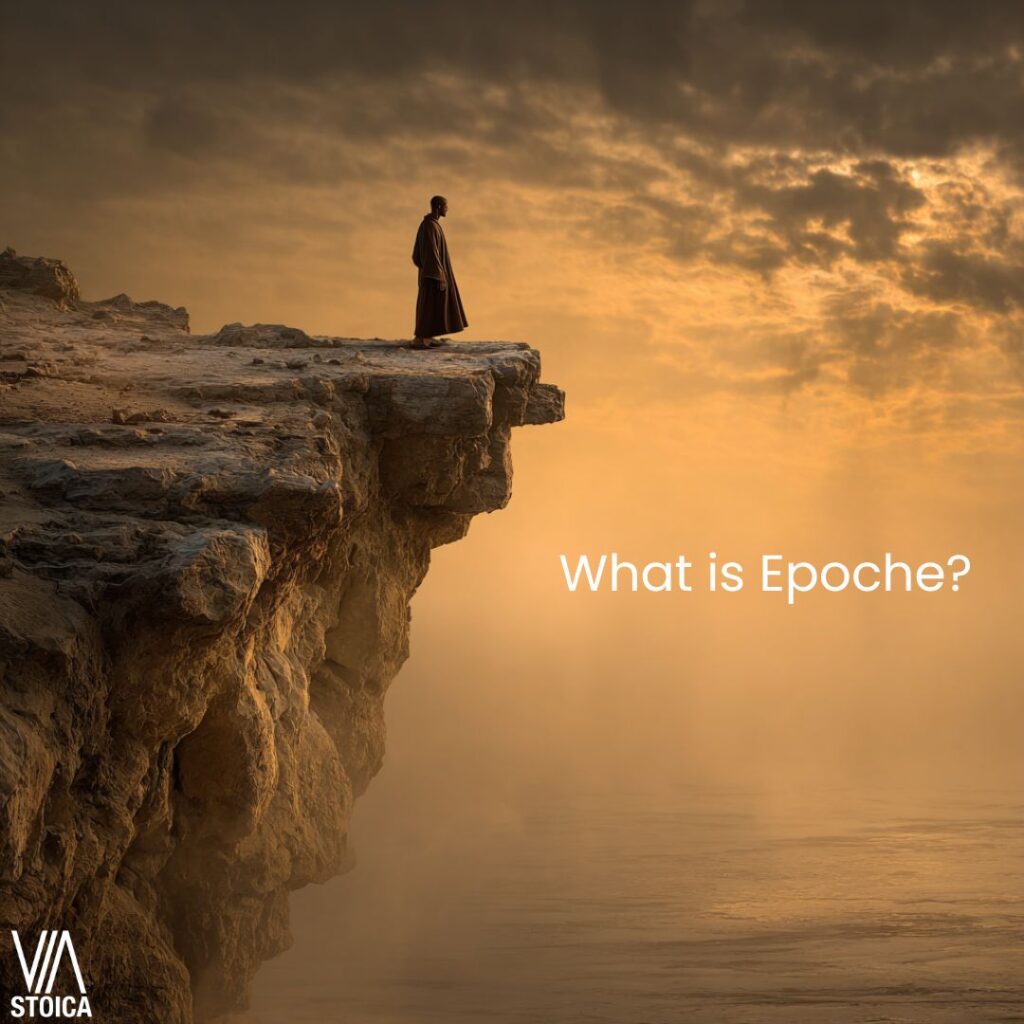What Is Epochē? Understanding the Stoic Meaning and Practice
What is Stoic Epoche?

In Stoicism, epochē (ἐποχή) means suspension of judgment. It is the deliberate pause before making a mental commitment to an impression, before deciding whether something is good, bad, or indifferent. This small space between appearance and action is where our freedom lives.
Sign up for our newsletter called: The Pause.
For modern readers, epochē is a powerful antidote to overthinking, emotional reactivity, and snap decisions. In a world of constant news, opinions, and notifications, learning to hold back judgment gives us calm, clarity, and the ability to act with reason instead of impulse.
Breaking Down the Word
The Greek word epochē (ἐποχή) comes from epéchō (ἐπέχω), meaning “to hold back” or “to suspend.”
- Literal sense: holding back, stopping.
- Philosophical sense: withholding assent to an impression until reason has examined it.
For the Stoics, this mattered because impressions (phantasiai) arrive uninvited. If we automatically agree with them, “this is terrible,” “that’s amazing”, we hand over our freedom. Epoche is the discipline that lets us hold back, test what appears, and choose wisely.
Key Dimensions of Epoche
- Suspension of Assent
Instead of rushing to judgment, we pause. This short delay gives reason space to examine impressions before we commit. - Training of Attention
Epochē works hand in hand with prosochē (attention). It is an active, watchful stance, noticing impressions without being swept away. - Defense Against Passion
By practicing epoche, we stop raw impulses from solidifying into destructive emotions. The pause breaks the chain from impression to passion. - Pathway to Wisdom
The wise person is not free from impressions but from error. Epoche ensures that judgments and actions align with truth and virtue.
Core Stoic Principles
- Phantasiai (φαντασίαι – impressions)
All experience begins with impressions. Epoche is the moment we say, “This is only an impression, not yet reality.” - Synkatathesis (συγκατάθεσις – assent)
After impressions arise, the ruling faculty can give assent. Epochē creates the pause that prevents hasty, false assent. - Hegemonikon (ἡγεμονικόν – ruling faculty)
This is the rational center of the soul. Practicing epochē protects the hegemonikon from being hijacked by impulsive reactions, keeping reason in command. - Apatheia (ἀπάθεια – freedom from destructive passions)
Initial impulses are not under our control, but whether they grow into passions is. Epoche is the first safeguard that helps us transform raw emotion into rational action, paving the way to apatheia.
Modern Misunderstandings
- Epochē is not indifference. It does not mean refusing to care or never making decisions.
- It is also not radical skepticism. Pyrrhonian Skeptics used the same word, but in Stoicism, epoche is temporary, a pause until reason confirms or denies an impression.
- Nor is it simply hesitation or weakness. For the Stoic, epochē is disciplined restraint, a purposeful check that makes our actions stronger, not weaker.
Why It’s Central to Stoicism
Our first emotional reactions are not under our control. Fear, anger, or desire can appear instantly, what the Stoics called propatheiai (pre-emotions). These flashes are natural, but if we act on them without examination, we risk being ruled by them.
That is why we need epochē. It gives us the ability to stop, test the impression, and decide whether it deserves assent. Epictetus gives us the exact words to practice with:
“But, in the first place, do not allow yourself to be carried away by its intensity: but say, ‘Impression, wait for me a little. Let me see what you are, and what you represent. Let me test you.’”
Epictetus, Discourses, Book 2, Chapter 18.24
By speaking to impressions in this way, we reclaim the power to act from reason rather than from impulse. This short pause is the difference between slavery to passion and freedom through virtue.
Practical Applications
- Journaling Prompt
At the end of the day, note one moment where you suspended judgment and one where you didn’t. What changed as a result? - Mindset Check
When a strong emotion arises, remind yourself: “This is only an impression, not yet the thing itself.” - Situational Exercise
When criticized, pause for three breaths before responding. Use that space to decide whether your reply serves reason or passion. - Daily Reflection
Each morning, prepare yourself: “Today I will face many impressions. I will pause before assenting, so that reason, not impulse, guides me.” - Discover your Pause
We all have different ways to pause, and it is up to us to discover what works best. With training, the moment of Epoche will become shorter and closer to the impulse. But first, we must understand how we pause best. A breath, a walk, journaling, or something else, experiment and find your pause.
FAQ
What does epochē mean in Stoicism?
It means suspending judgment until reason has examined whether an impression is true, false, good, or bad.
Is epochē the same as doubt?
No. Doubt is passive uncertainty. Epoche is active restraint, holding back judgment until the ruling faculty decides.
Can anyone develop epochē?
Yes. With practice, small pauses grow into a stable discipline. Anyone can train themselves to hold back and test impressions.
Epoche is the pause
Epochē is the pause that keeps us free. We cannot stop impressions or first impulses from arising, but we can stop them from ruling us. By suspending judgment, we protect the ruling faculty, align our choices with reason, and step closer to apatheia. In the stillness between impression and action, we discover true strength.
Want to explore more Stoic strategies?
Book a free consultation with one of our Stoic Coaches or learn about more Stoic philosophy terms. You can also listen to the Via Stoica podcast on Spotify or Apple Podcasts or watch it on YouTube.
Author Bio
Benny Voncken is the co-founder of Via Stoica, where he helps people apply Stoic philosophy to modern life. He is a Stoic coach, writer, and podcast host of The Via Stoica Podcast. With almost a decade of teaching experience and daily Stoic practice, Benny creates resources, workshops, and reflections that make ancient wisdom practical today.
Related Posts
-
 Inner Life Terms
Inner Life TermsWhat Are Values? Principles That Guide Action and Display Nature
What are Values? Most people don’t wake up thinking about their values. They notice them indirectly, when something feels slightly misaligned. When a choice looks right on paper but leaves a faint sense of resistance. When success arrives, yet doesn’t land the way it was expected to. Values are often mistaken for opinions, preferences, or […]
Read more -
 Via Stoica Podcast
Via Stoica PodcastA Stoic Conversation with Jason Nelson: Six Seeds for a Happier Life
What if happiness is not something you achieve one day, but something you practice every day? In A Balm for Your Soul: Six Seeds for Happiness, Jason Nelson offers a grounded and humane answer to a question many people quietly struggle with: Why does life still feel off, even when things look good on paper?Rather […]
Read more -
 Greek Stoic Philosophy Terms
Greek Stoic Philosophy TermsWhat Is Philanthropia? How Stoicism Views Love for Humankind
What Is Philanthropia? Philanthropia in Stoicism is the cultivated disposition to care for human beings simply because they are human. It describes a rational, practiced goodwill toward others that flows from understanding our shared nature, rather than from emotion, obligation, or reward. This concept matters today because modern life often treats kindness as optional, sentimental, […]
Read more


Comments 0